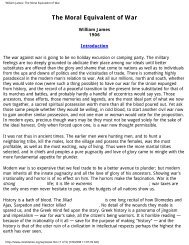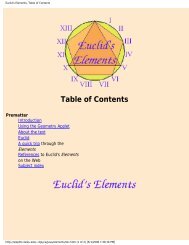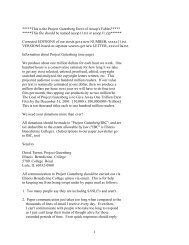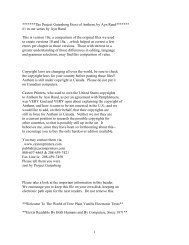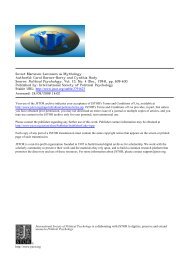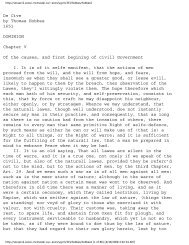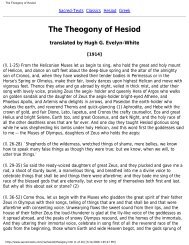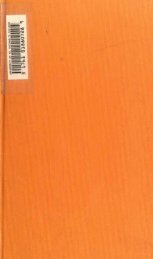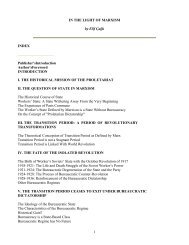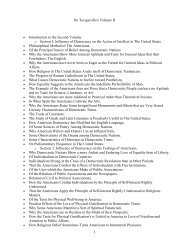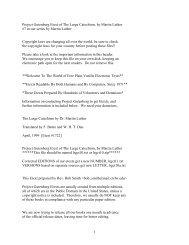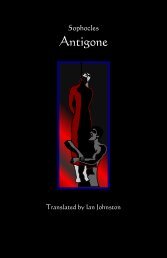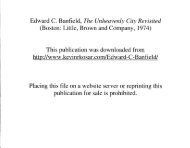Thomas Jefferson: A Manual of Parliamentary Practice
Thomas Jefferson: A Manual of Parliamentary Practice
Thomas Jefferson: A Manual of Parliamentary Practice
You also want an ePaper? Increase the reach of your titles
YUMPU automatically turns print PDFs into web optimized ePapers that Google loves.
<strong>Thomas</strong> <strong>Jefferson</strong>: A <strong>Manual</strong> <strong>of</strong> <strong>Parliamentary</strong> <strong>Practice</strong><br />
IF, on a question for rejection, a bill be retained, it passes <strong>of</strong> course to its next reading.<br />
Hakew. 141. Scob. 42. And a question for a second reading, determined negatively, is a<br />
rejection without farther question. 4 Grey 149. And see Elsynge's Memor. 42. in what cases<br />
questions are to be taken for rejection.<br />
Where questions are perfectly equivalent, so that the negative <strong>of</strong> the one amounts to the<br />
affirmative <strong>of</strong> the other, and leaves no other alternative, the decision <strong>of</strong> the one concludes<br />
necessarily the other. 4 Grey 157. Thus the negative <strong>of</strong> striking out amounts to the<br />
affirmative <strong>of</strong> agreeing; and therefore, to put a question on agreeing after that on striking out,<br />
would be to put the same question in effect twice over. Not so in questions <strong>of</strong> amendments<br />
between the two Houses. A motion to recede being negatived, does not amount to a positive<br />
vote to insist, because there is another alternative, to wit, to adhere.<br />
A bill originating in one House, is passed by the other with an amendment. A motion in the<br />
originating House to agree to the amendment is negatived. Does there result from this a vote<br />
<strong>of</strong> disagreement, or must the question on disagreement be expressly voted The questions<br />
respecting amendments from another House are, 1. To agree. 2. Disagree. 3. Recede. 4.<br />
Insist. 5. Adhere.<br />
1st. To agree.<br />
2nd. To disagree. Either <strong>of</strong> these concludes the other necessarily: for the positive<br />
<strong>of</strong> either is exactly the equivalent <strong>of</strong> the negative <strong>of</strong> the other, and no other<br />
alternative remains. On either motion amendments to the amendment may be<br />
proposed, e.g. if it be moved to disagree, those who are for the amendment have<br />
a right to propose amendments, and to make it as perfect as they can, before the<br />
question <strong>of</strong> disagreeing is put.<br />
3d. To recede. You may then either insist or adhere.<br />
4th. To insist. You may then either recede or adhere.<br />
5th. To adhere. You may then either recede or insist.<br />
Consequently the negative <strong>of</strong> these is not equivalent to a positive vote the other way. It does<br />
not raise so necessary an implication as may authorise the secretary by inference to enter<br />
another vote: for two alternatives still remain, either <strong>of</strong> which may be adopted by the House.<br />
SEC. XXXIX.<br />
THE QUESTION.<br />
THE question is to be put first on the affirmative, and then on the negative side.<br />
http://www.constitution.org/tj/tj-mpp.htm (46 <strong>of</strong> 70) [4/14/2008 6:37:46 PM]



